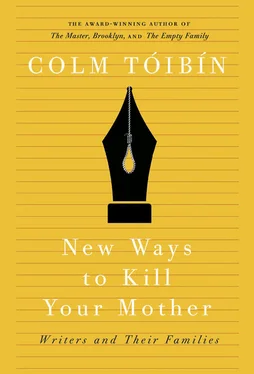has a force and colour that make it the only form of English that is quite suitable for incidents of the epic kind, and in her intercourse with the peasants of the west Lady Gregory has learned to use this vocabulary in a new way, while she carries with her plaintive Gaelic constructions that make her language, in a true sense, a language of Ireland.
He was working on the drafts of his early plays. In The Shadow of the Glen and The Tinker’s Wedding he was, to some small extent, dramatizing the role of the artist, or the outsider, versus the role of the settled and respectable community; in other words, he made these plays as versions of his own plight at being turned down by Cherrie Matheson. Other aspects of these plays came from his own dreams and observations, especially in the summer months in Wicklow. Edward Stephens, who was fourteen at the time his uncle worked on these plays, wrote that the material
was derived from the lore of the country people, not from any direct association with the tinkers themselves. They were so dirty and in their mode of life so disreputable that it would have been impossible for John to mix with them at his ease. He warned me against dropping into conversation with them on the road.
By the beginning of October 1902 Synge had finished both Riders to the Sea and In the Shadow of the Glen . On his way to the Aran Islands for his final visit — his book on the islands still had not found a publisher — he stopped off at Coole to show the plays to Yeats and Lady Gregory, who described the plays as ‘both masterpieces, both perfect in their way’. Later she wrote: ‘He had gathered emotion, the driving force he needed from his life among the people, and it was the working in dialect that set free his style.’ Yeats saw the language of the Bible as another influence.
Early the following year he decided to give up his room in Paris. When he unpacked his French belongings in Dublin, Edward Stephens watched him taking out ‘the knife and fork and little frying pan that he had used in Paris, he showed them to me as if they were things he regarded with affection. I asked him whether they had ever been cleaned, he replied: “A thing that is used by me only is never dirty.”’ Because of attacks of asthma he spent that summer in Kerry rather than in Wicklow, returning to Dublin for the rehearsals of The Shadow of the Glen , which opened in October to considerable controversy. When Synge and his mother went down to breakfast the morning after the opening night, they read in The Irish Times that the play was ‘excessively distasteful’ while the critic admitted ‘the cleverness of the dialect and the excellent acting of Nora and the tramp’.
Edward Stephens wrote about his grandmother’s response to the coverage of the play:
All she read in the Irish Times perplexed her. She had thought of John as being overpersuaded by his literary friends into praising everything Irish but, now that a play of his had been acted, the newspapers were censuring him for attacking Irish character. She disliked the kind of publicity his work was getting, she was sorry that he should have adopted a form of dramatic writing that was likely to prove no more remunerative than the Aran book, and she was sorry that any of his work should be connected with the stage.
Mrs Synge also worried about her son, now aged thirty-two, being out late. She wrote in her diary: ‘After a dreadful storm last night, I had a headache from lying awake listening to the storm and watching for Johnnie who was not home until 3.30.’
The Irish Times had nothing much good to say about Riders to the Sea either when the play opened in February 1904. The Synges disapproved of what they read about it. ‘The idea underlying the work is good enough,’ the critic said,
but the treatment of it is to our mind repulsive. Indeed the play develops into something like a wake. The long exposure of the dead body before an audience may be realistic, but is certainly not artistic. There are some things which are lifelike, and yet are quite unfit for presentation on the stage, and we think that ‘Riders to the Sea’ is one of them.
Edward Stephens remembered his father’s response: ‘If they want an Irish play, why can’t they act “The Shaughraun”?’
The plays, however, were much praised by the London critics, but this made no difference to Synge’s family, who were, Edward Stephens wrote, ‘serenely unaware of the importance of his work’. After a time in the west, Synge decided in October 1904 to find his own lodgings in Rathmines and move out of the family home for the first time in Dublin. In January 1905 The Well of the Saints went into rehearsal with a walk-on part for a young actress, Molly Allgood, whose sister Sara was a well-known actress. She was nineteen. Soon she began to play important roles in the theatre’s repertoire, including Synge’s plays. Synge fell in love with her.
Both the Synge family and Lady Gregory disapproved of his relationship with Molly, the Synges for religious and social reasons, Lady Gregory because she did not want directors of the theatre consorting too freely with its employees. While he could not keep the relationship a secret from Lady Gregory, Synge could hide it from his family. On 5 November 1906, when he had moved back into his mother’s house and given up his flat, he wrote to Molly: ‘My mother asked me again if I was alone, and I said I had “a friend” with me. I must tell her soon.’ Seventeen days later, he wrote again: ‘I showed my mother your photo the other night and told her you were a great friend of mine. That is as far as I can go until I am stronger. I am thoroughly sick of this state of affairs, we must end it, and make ourselves public.’ That day, as he was suffering from influenza, Molly came to his mother’s house. Later, Synge wrote to her: ‘My mother is too shy to say much about you, but I think she is pleased. She said you seemed very bright and she hoped I had asked you to come down on Sunday and cheer me up. I said I hadn’t but I would write. Today she has reminded me several times not to forget my note to you.’
The following month, when he told his mother he was engaged to Molly, he wrote:
I heard from my mother. She says she thought ‘the friend’ I have been walking with was a man, but that my showing her the photo and the letters that came so often when I was ill made her think there was some thing. Then she says it would be a good thing if it would make me happier, and to wind up she points out how poor we shall be with only £100 a year. Quite a nice letter for the first go off. So that is satisfying.
While Synge sent Molly only the good news about his mother’s response to his marrying a Catholic, it is easy to read between the lines of his letters. The following March, for example, he remarked that his mother ‘is much more rational about it than she was’. This suggests that she had been, in the previous months, irrational in her response. Later that month, she began to ask in some detail about her future daughter-in-law: ‘My mother was enquiring about your temper today, she says my temper is so bad, it would be a terrible thing to marry a bad-tempered wife.’
That January, as the rehearsals for The Playboy of the Western World started, Synge began to write to Molly about the possibility of finding a flat. Molly was playing Pegeen Mike. Willie Fay, who was producing, and his brother Frank realized how much indignation the play would provoke:
Frank and I begged him to make Pegeen a decent likeable country girl, which she might easily have been without injury to the play, and to take out the torture scenes in the last act, where the peasants burn Christy with lit turf… Frank and I might as well have saved our breath. We might as well have tried to move the Hill of Howth as move Synge.
Читать дальше












